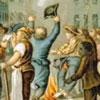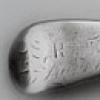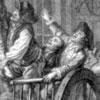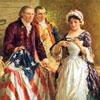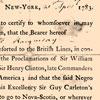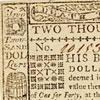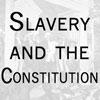When we think about the American Revolution, the first images that generally spring to mind are heroic battle scenes, victories against all odds, and acts of individual bravery and resourcefulness. Most of these images feature male heroes and many, as in the case of the “Molly Pitcher” stories, are not entirely accurate.
The roles of civilians, and women in particular, in the Revolution have been largely neglected by history texts. As historian Holly A. Mayer reminds us, “not all men left to serve in the military and not all women stayed home.”[1] A significant number of civilians, women and men, followed the armies of both sides in official and unofficial capacities. These men and women were often referred to as camp followers.
Sarah Osborn was a servant in a blacksmith’s household in Albany, New York, when she met and married Aaron Osborn, a blacksmith and Revolutionary war veteran, in 1780. When he re-enlisted as a commissary sergeant, Sarah agreed to accompany him. They went first to West Point, and Sarah later traveled with the Continental army in the southern colonies, working as a washerwoman and cook. This account comes from a deposition she filed in 1837, at the age of 81, as part of a claim under the first pension act for Revolutionary war veterans and their widows. Thus, Osborn is referred to as “deponent” in this text.
Sarah Osborn’s application for Revolutionary War pension, 1837
…after deponent had married said [Aaron] Osborn, he informed her that he was returned during the war, and that he desired deponent to go with him. Deponent declined until she was informed by Captain Gregg that her husband should be put on the commissary guard, and that she should have the means of conveyance either in a wagon or on horseback. That deponent then in the same winter season in sleighs accompanied her husband and the forces under command of Captain Gregg on the east side of the Hudson river to Fishkill, then crossed the river and went down to West Point.
… They continued their march to Philadelphia, deponent on horseback through the streets, and arrived at a place towards the Schuylkill where the British had burnt some houses, where they encamped for the afternoon and night. Being out of bread, deponent was employed in baking the afternoon and evening….
They, however, marched immediately for a place called Williamsburg, as she thinks, deponent alternately on horseback and on foot. There arrived, they remained two days till the army all came in by land and then marched for Yorktown, or Little York as it was then called. The York troops were posted at the right, the Connecticut troops next, and the French to the left. In about one day or less than a day, they reached the place of encampment about one mile from Yorktown. Deponent was on foot and the other females above named and her said husband still on the commissary’s guard… . Deponent took her stand just back of the American tents, say about a mile from the town, and busied herself washing, mending, and cooking for the soldiers, in which she was assisted by the other females; some men washed their own clothing. She heard the roar of the artillery for a number of days, and the last night the Americans threw up entrenchments, it was a misty, foggy night, rather wet but not rainy. Every soldier threw up for himself, as she understood, and she afterwards saw and went into the entrenchments. Deponent’s said husband was there throwing up entrenchments, and deponent cooked and carried in beef, and bread, and coffee {in a gallon pot) to the soldiers in the entrenchment.
On one occasion when deponent was thus employed carrying in provisions, she met General Washington, who asked her if she “was not afraid of the cannonballs?”
She replied, “No, the bullets would not cheat the gallows,” that “It would not do for the men to fight and starve too.”
They dug entrenchments nearer and nearer to Yorktown every night or two till the last. While digging that, the enemy fired very heavy till about nine o’clock next morning, then stopped, and the drums from the enemy beat excessively. Deponent was a little way off in Colonel Van Schaick’s or the officers’ marquee and a number of officers were present, among whom was Captain Gregg, who, on account of infirmities, did not go out much to do duty.
The drums continued beating, and all at once the officers hurrahed and swung their hats, and deponent asked them, “What is the matter now?”
One of them replied, “Are not you soldier enough to know what it means?”
Deponent replied, “No.”
They then replied, “The British have surrendered.”
Deponent, having provisions ready, carried the same down to the entrenchments that morning, and four of the soldiers whom she was in the habit of cooking for ate their breakfasts.
Deponent stood on one side of the road and the American officers upon the other side when the British officers came out of the town and rode up to the American officers and delivered up [their swords, which the deponent] thinks were returned again, and the British officers rode right on before the army, who marched out beating and playing a melancholy tune, their drums covered with black handkerchiefs and their fifes with black ribbands tied around them, into an old field and there grounded their arms and then returned into town again to await their destiny. Deponent recollects seeing a great many American officers, some on horseback and some on foot, but cannot call them all by name. Washington, Lafayette, and Clinton were among the number. The British general at the head of the army was a large, portly man, full face, and the tears rolled down his cheeks as he passed along. She does not recollect his name, but it was not Cornwallis. She saw the latter afterwards and noticed his being a man of diminutive appearance and having cross eyes… .
After two or three days, deponent and her husband, Captain Gregg, and others who were sick or complaining embarked on board a vessel from Yorktown, not the same they came down in, and set sail up the Chesapeake Bay and continued to the Head of Elk, where they landed. The main body of the army remained behind but came on soon afterwards. Deponent and her husband proceeded with the commissary’s teams from the Head of Elk, leaving Philadelphia to the right, and continued day after day till they arrived at Pompton Plains in New Jersey. Deponent does not recollect the county. They were joined by the main body of the army under General Clinton’s command, and they set down for winter quarters. Deponent and her husband lived a part of the time in a tent made of logs but covered with cloth, and a part of the time at a Mr. Manuel’s near Pompton Meetinghouse. She busied herself during the winter in cooking and sewing as usual. Her said husband was on duty among the rest of the army and held the station of corporal from the time he left West Point.
In the opening of spring, they marched to West Point and remained there during the summer, her said husband still with her. In the fall they came up a little back of New-burgh to a place called New Windsor and put up huts on Ellis’s lands and again sat down for winter quarters, her said husband still along and on duty. The York troops and Connecticut troops were there. In the following spring or autumn they were all discharged. Deponent and her said husband remained in New Windsor in a log house built by the army until the spring following. Some of the soldiers boarded at their house and worked round among the farmers, as did her said husband also.
Deponent and her said husband spent certainly more than three years in the service, for she recollects a part of one winter at West Point and the whole of another winter there, another winter at Pompton Plains, and another at New Windsor. And her husband was the whole time under the command of Captain Gregg as an enlisted soldier holding the station of corporal to the best of her knowledge.
In the winter before the army were disbanded at New Windsor, on the twentieth of February, deponent had a child by the name of Phebe Osborn, of whom the said Aaron Osborn was the father. A year and five months afterwards, on the ninth day of August at the same place, she had another child by the name of Aaron Osborn, Jr., of whom the said husband was the father… .
About three months after the birth of her last child, Aaron Osborn, Jr., she last saw her said husband, who then left her at New Windsor and never returned. He had been absent at intervals before this from deponent, and at one time deponent understood he was married again to a girl by the name of Polly Sloat above Newburgh about fifteen or sixteen miles. Deponent got a horse and rode up to inquire into the truth of the story. She arrived at the girl’s father’s and there found her said husband, and Polly Sloat, and her parents. Deponent was kindly treated by the inmates of the house but ascertained for a truth that her husband was married to said girl. After remaining overnight, deponent determined to return home and abandon her said husband forever, as she found he had conducted in such a way as to leave no hope of reclaiming him. About two weeks afterwards, her said husband came to see deponent in New Windsor and offered to take deponent and her children to the northward, but deponent declined going, under a firm belief that he would conduct no better, and her said husband the same night absconded with two others, crossed the river at Newburgh, and she never saw him afterwards. This was about a year and a half after his discharge….
After deponent was thus left by Osborn, she removed from New Windsor to Blooming Grove, Orange County, New York, about fifty years ago, where she had been born and brought up, and, having married Mr. [John] Benjamin … she continued to reside there perhaps thirty-five years, when she and her husband Benjamin removed to Pleasant Mount, Wayne County, Pennsylvania, and there she has resided to this day. Her said husband, John Benjamin, died there ten years ago last April, from which time she has continued to be and is now a widow.
Idealized expectations for American women during the Revolution focused on femininity and domesticity, and the life of a camp follower contradicted these ideals. The armies, however, would have been hard pressed to replace the work of these women and of the men who chose support roles over combat. Although camp followers took some of the army’s resources, they provided even more by cooking, cleaning, caring for troops, and serving as nurses, servants, and wagoners.
1. Holly A. Mayer, “Women and Wagoners: Camp Followers in the American War for Independence,” History Now, no. 21 (September 2009).



